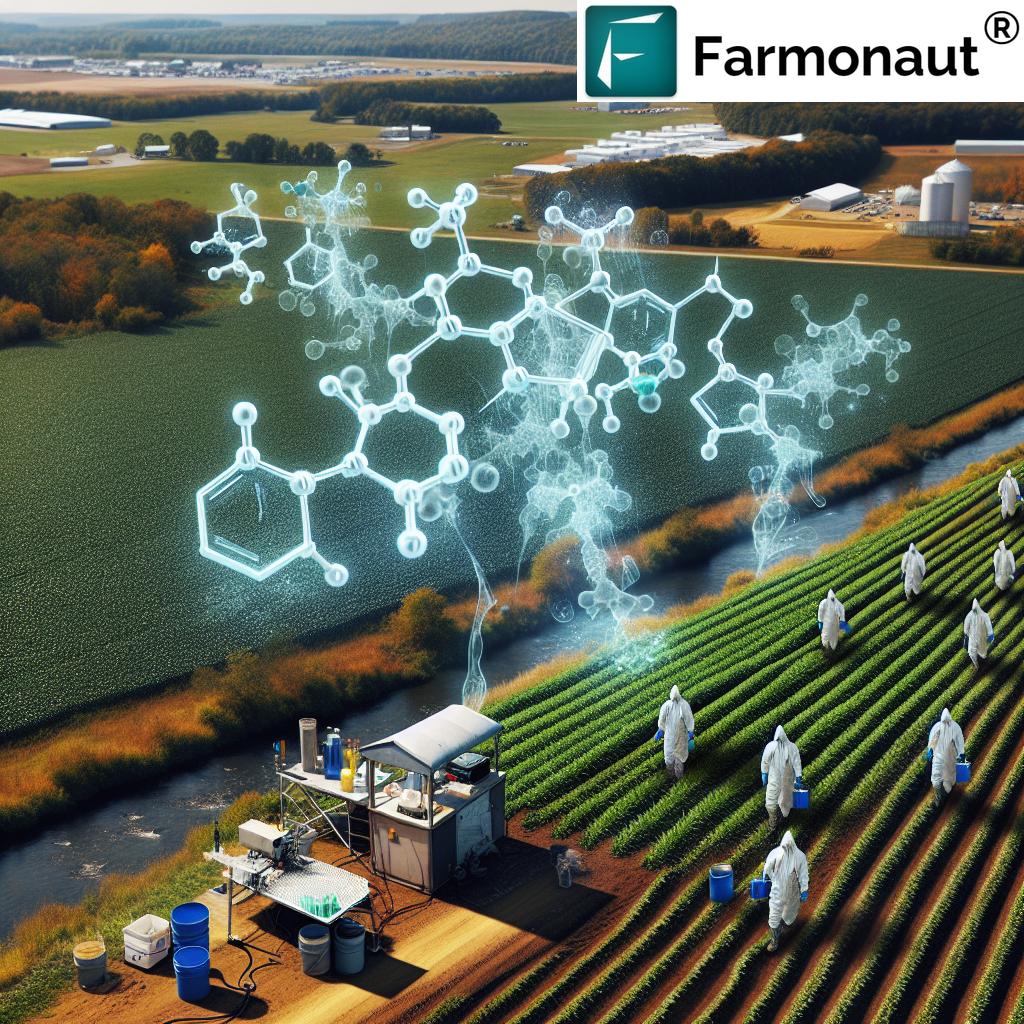Farmonaut: Safeguarding Maryland Farms from PFAS Contamination – Innovative Solutions for Soil and Water Remediation

“PFAS, known as ‘forever chemicals,’ can persist in soils, animals, and plants for decades, posing long-term environmental risks.”
In the heart of Maryland’s agricultural landscape, a pressing issue has emerged that threatens the very foundation of our farming communities. The recent lawsuit against W.L. Gore & Associates has brought to light the pervasive danger of per- and polyfluoroalkyl substances (PFAS), commonly known as “forever chemicals,” contaminating our farmlands and water sources. As we at Farmonaut delve into this critical environmental challenge, we recognize the urgent need for innovative solutions to protect our soil, water, and ultimately, the health of our communities.
Environmental contamination in agriculture poses significant risks to water quality and soil health, with PFAS being at the forefront of these concerns. These synthetic chemicals, including perfluorooctanoic acid (PFOA), have been linked to severe health risks, including cancer, immune system issues, and reproductive harm. The persistence of PFAS in our environment is alarming, as they can remain in soils, animals, and plants for decades, creating a legacy of pollution that threatens future generations.
Understanding the PFAS Crisis in Maryland
The state of Maryland has taken a bold step by initiating a lawsuit against W.L. Gore & Associates, alleging that the company, known for its production of Gore-Tex, has been knowingly contaminating the environment with PFAS. This legal action underscores the severity of the situation and the need for accountability in protecting our natural resources.
- The lawsuit focuses on contamination in Cecil County, northeast Maryland
- Drinking water, surface water, groundwater, soil, and wildlife have been affected
- PFOA levels near Gore’s facilities have exceeded EPA safety limits
The impact of this contamination extends far beyond the immediate vicinity of the manufacturing facilities. Farmers across Maryland are now grappling with the potential consequences of PFAS pollution on their crops, livestock, and the overall health of their land.
The Role of Farmonaut in Addressing PFAS Contamination
At Farmonaut, we recognize the critical need for advanced technological solutions to combat environmental challenges in agriculture. Our satellite-based farm management platform offers invaluable tools for monitoring and managing environmental risks, including those posed by chemical pollutants like PFAS.
Through our advanced satellite imagery and AI-powered analytics, we provide farmers with real-time insights into their land’s health, enabling them to detect anomalies that may indicate contamination. Our commitment to sustainable farming practices aligns perfectly with the urgent need to address PFAS pollution in Maryland’s agricultural sector.
Innovative Solutions for Soil and Water Remediation
Addressing PFAS contamination requires a multi-faceted approach, combining cutting-edge technology with proven remediation techniques. Here are some innovative solutions that we at Farmonaut believe can make a significant impact:
- Satellite-Based Monitoring: Utilizing our advanced satellite imagery to detect changes in vegetation health that may indicate soil contamination.
- AI-Driven Soil Analysis: Employing artificial intelligence to analyze soil composition and identify areas of potential PFAS accumulation.
- Precision Agriculture Techniques: Implementing targeted remediation efforts based on precise mapping of contaminated areas.
- Water Filtration Systems: Developing and deploying advanced filtration technologies specifically designed to remove PFAS from water sources.
- Phytoremediation: Exploring the use of specific plants known to absorb and break down PFAS compounds in soil.
The Impact of PFAS on Maryland’s Agricultural Ecosystem
The presence of PFAS in Maryland’s farmlands has far-reaching consequences for the entire agricultural ecosystem. These chemicals can:
- Contaminate crops, making them unsafe for consumption
- Accumulate in livestock, potentially entering the food chain
- Degrade soil quality, affecting long-term agricultural productivity
- Pollute water sources used for irrigation and livestock
Understanding the extent of this impact is crucial for developing effective remediation strategies. At Farmonaut, we’re leveraging our technology to help farmers and environmental agencies map and monitor PFAS contamination across Maryland’s agricultural lands.
Agricultural Water Quality Testing: A Critical Step
One of the most immediate concerns in addressing PFAS contamination is ensuring the safety of agricultural water sources. Comprehensive water quality testing is essential for:
- Identifying contaminated water sources
- Monitoring PFAS levels over time
- Assessing the effectiveness of remediation efforts
- Ensuring compliance with EPA and state regulations
Farmonaut’s platform integrates with various water quality testing methods, providing farmers with a centralized system to track and analyze water safety data. This integration is crucial for making informed decisions about water usage and implementing appropriate filtration systems.
Explore Farmonaut’s API for advanced data integration
Soil Contamination Remediation Techniques
Addressing PFAS contamination in soil requires a combination of innovative and traditional remediation techniques. Some effective methods include:
- Excavation and Disposal: Removing heavily contaminated soil for safe disposal
- In-Situ Chemical Oxidation: Using oxidizing agents to break down PFAS compounds
- Soil Washing: Employing water-based solutions to separate contaminants from soil
- Bioremediation: Utilizing microorganisms to degrade PFAS compounds
- Thermal Desorption: Applying heat to vaporize and capture PFAS from soil
Farmonaut’s satellite imagery and AI analytics can help identify the most suitable remediation techniques for specific areas, optimizing the efficiency and effectiveness of cleanup efforts.

Water Filtration for Agriculture: Ensuring Safe Irrigation
Implementing effective water filtration systems is crucial for safeguarding agricultural operations from PFAS contamination. Advanced filtration technologies can:
- Remove PFAS from irrigation water
- Protect crops from absorbing these harmful chemicals
- Ensure the safety of water used for livestock
- Prevent further contamination of soil through irrigation
Farmonaut’s platform can help farmers monitor the effectiveness of their water filtration systems by tracking water quality metrics over time. This data-driven approach allows for timely adjustments and optimizations to ensure the highest level of water safety.
The Role of Federal and State Agencies in PFAS Regulation
The fight against PFAS contamination in Maryland involves multiple layers of government oversight and regulation. Key players include:
- The Environmental Protection Agency (EPA)
- Maryland Department of the Environment
- Maryland Department of Agriculture
- Local county health departments
These agencies work together to establish guidelines, conduct testing, and enforce regulations aimed at protecting public health and the environment from PFAS contamination. Farmonaut’s technology can assist these agencies by providing comprehensive data on soil and water health across Maryland’s agricultural regions.
Long-Term Effects of PFAS on the Environment
The persistence of PFAS in the environment poses significant long-term challenges for Maryland’s ecosystems. These “forever chemicals” can:
- Accumulate in the food chain, affecting wildlife populations
- Alter soil microbial communities, impacting nutrient cycling
- Contaminate groundwater aquifers for decades
- Reduce biodiversity in affected areas
Understanding these long-term effects is crucial for developing sustainable remediation strategies. Farmonaut’s ongoing monitoring capabilities provide valuable data for tracking the progress of cleanup efforts and the recovery of affected ecosystems over time.
Access Farmonaut’s API Developer Docs for in-depth environmental monitoring
Protecting Crops from Harmful Toxins
Farmers in Maryland must take proactive steps to protect their crops from PFAS and other harmful toxins. Some effective strategies include:
- Regular soil testing to monitor contamination levels
- Implementing crop rotation to minimize toxin uptake
- Using organic farming practices to improve soil health
- Employing phytoremediation techniques with specific plant species
- Utilizing precision agriculture methods to target problem areas
Farmonaut’s satellite-based crop health monitoring can help farmers identify potential issues early, allowing for timely interventions to protect crop quality and yield.
Sustainable Farming Practices in the Face of PFAS Contamination
Adopting sustainable farming practices is more critical than ever in light of the PFAS contamination crisis. These practices not only help mitigate the impact of existing pollution but also prevent further environmental degradation. Key sustainable farming strategies include:
- Conservation tillage to reduce soil erosion and improve soil health
- Integrated pest management to minimize chemical use
- Cover cropping to enhance soil organic matter and reduce runoff
- Precision irrigation to conserve water and prevent contaminant spread
- Agroforestry practices to create natural buffers against pollution
Farmonaut’s platform supports these sustainable practices by providing farmers with detailed insights into their land’s health and resource usage. Our AI-driven advisory system, Jeevn AI, offers personalized recommendations to help farmers implement and optimize these sustainable techniques.
The Future of Maryland Agriculture: Overcoming PFAS Challenges
As Maryland grapples with the PFAS contamination crisis, the future of agriculture in the state depends on our ability to innovate and adapt. The path forward involves:
- Continued research into PFAS remediation techniques
- Development of PFAS-resistant crop varieties
- Implementation of advanced water treatment technologies
- Strengthening of environmental regulations and enforcement
- Increased public awareness and engagement in environmental issues
Farmonaut is committed to being at the forefront of these efforts, providing cutting-edge technology and data-driven insights to support Maryland’s farmers and environmental agencies in their fight against PFAS contamination.
PFAS Contamination Comparison Table
| PFAS Chemical Type | Estimated Concentration in Soil (ppm) | Estimated Concentration in Water (ppt) | Potential Health Risks | Remediation Techniques |
|---|---|---|---|---|
| PFOA | 0.1 – 10 | 10 – 1000 | Cancer, liver damage, thyroid disorders | Activated carbon filtration, ion exchange |
| PFOS | 0.05 – 5 | 5 – 500 | Immune system suppression, developmental issues | Reverse osmosis, soil washing |
| GenX | 0.01 – 1 | 1 – 100 | Liver and kidney effects, potential carcinogen | Advanced oxidation processes, phytoremediation |
“Recent lawsuits have highlighted the dangers of PFAS contamination in farmland and drinking water sources across Maryland.”
Conclusion: A Call to Action for Maryland’s Agricultural Community
The PFAS contamination crisis in Maryland’s farmlands is a wake-up call for our agricultural community. It underscores the critical need for vigilance, innovation, and collective action to protect our soil, water, and the health of our communities. As we move forward, the integration of advanced technologies, sustainable farming practices, and rigorous environmental monitoring will be key to overcoming this challenge.
At Farmonaut, we remain committed to providing farmers and environmental agencies with the tools and insights needed to combat PFAS contamination effectively. Our satellite-based monitoring, AI-driven analytics, and comprehensive farm management solutions offer a powerful arsenal in the fight against environmental pollution.
Together, we can work towards a future where Maryland’s farms are not only productive but also safe and sustainable for generations to come. The path ahead may be challenging, but with innovative solutions and a united front, we can safeguard our agricultural heritage and ensure a healthier environment for all.
FAQ Section
Q: What are PFAS, and why are they a concern for Maryland farms?
A: PFAS (per- and polyfluoroalkyl substances) are synthetic chemicals known as “forever chemicals” due to their persistence in the environment. They pose significant risks to soil and water quality, potentially contaminating crops and water sources, which is a major concern for Maryland’s agricultural sector.
Q: How can farmers test for PFAS contamination on their land?
A: Farmers can conduct soil and water tests through certified laboratories. Additionally, Farmonaut’s satellite-based monitoring can help detect vegetation health changes that may indicate contamination.
Q: What remediation techniques are most effective for PFAS in agricultural settings?
A: Effective techniques include soil excavation, chemical oxidation, phytoremediation, and advanced water filtration systems. The choice depends on the contamination level and specific site conditions.
Q: How can Farmonaut’s technology help in addressing PFAS contamination?
A: Farmonaut provides satellite imagery and AI-powered analytics to monitor crop health, detect anomalies, and track remediation progress. Our platform also offers insights for implementing sustainable farming practices that can mitigate contamination risks.
Q: What steps can farmers take to protect their crops from PFAS contamination?
A: Farmers can implement regular soil and water testing, use advanced filtration systems for irrigation, practice crop rotation, and adopt precision agriculture techniques to minimize exposure to contaminated areas.






